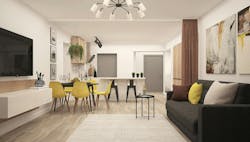California updates building code for adaptive reuse of office, retail structures for housing
By Peter Fabris, Contributing Editor
The California Building Standards Commission recently voted to make it easier to convert commercial properties to residential use.
The commission adopted provisions of the International Existing Building Code (IEBC) that allow developers more flexibility for adaptive reuse of retail and office structures. Such projects can reduce the carbon footprint of construction, while also helping revitalize communities, according to an AIA California news release.
The potential for commercial-to-residential conversions to create new housing is enormous, the release says. AIA cited a recent RAND Corporation report that found some 2300 underutilized commercial properties in Los Angeles County alone could produce 72,000 to 113,000 housing units.
The International Existing Building Code provides three options for conversions, known as compliance paths: Prescriptive; Work Area; and Performance. All three paths lead to safe, code-compliant buildings, but their differences allow design professionals significant latitude to find a code path best suited for a particular building. Prior to the changes, the California code included only the Prescriptive path, limiting potential for adaptive reuse.
